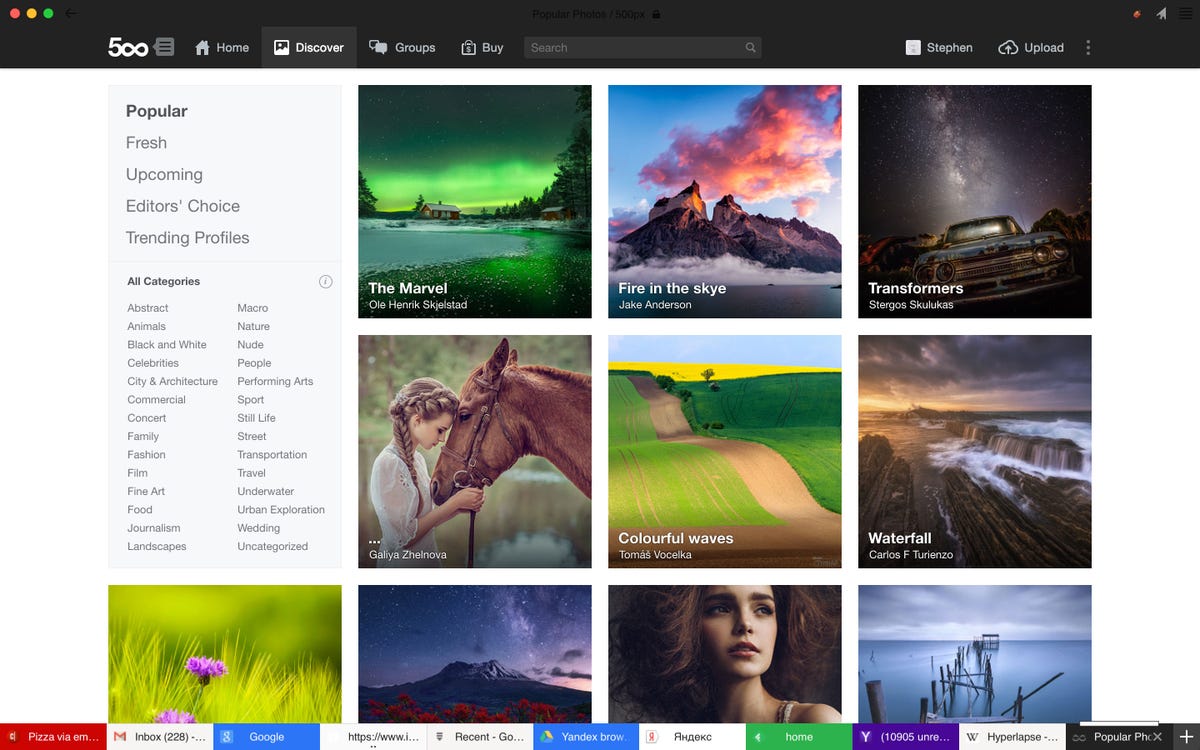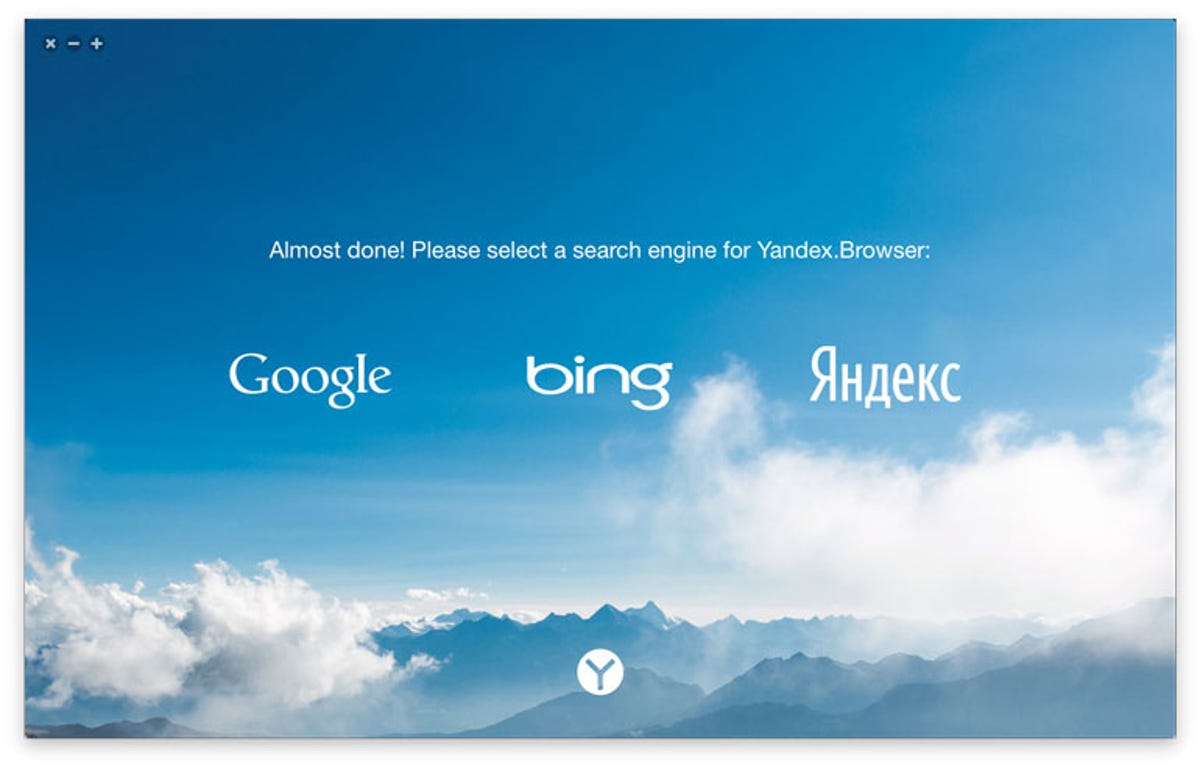
Screenshot by Stephen Shankland/CNET
You wouldn’t call it a war, but we may be in the middle of a skirmish that pits an upstart Russian browser maker against the mighty Google.
That company is Yandex, which on Thursday released a beta version of its streamlined Yandex.Browser that strips away the clutter that obscures how we see the Web. The browser features a dramatically pared-back interface that puts almost all the focus on websites and as little as possible on browser controls like buttons and search bars. For example, tabs that house individual websites are moved down to the bottom of the page, reflecting their subordinate status.
RELATED STORIES
- Google parts ways with Apple over WebKit, launches Blink
- Microsoft rips old IE technologies out of its new Edge browser
- Yandex browser’s tidy new interface puts Web apps first
- Microsoft rethinks the browser with Edge (hands-on)
The beta release signals that Yandex is ready for a wider audience to test the browser — it’s available now for Microsoft’s Windows and Apple’s OS X and is coming later for phones and tablets. Additionally, it shows that the company is committed to its browser project, despite the fact that the vast majority of the browser market power is in the hands of Google, Microsoft, Apple and Mozilla.
To be sure, Yandex.Browser isn’t likely to push aside the browser heavyweights outside Yandex’s core market in countries like Russia, Ukraine and Turkey. But even a second-tier browser can have a big impact on the market. Norway’s Opera Software, for example, pioneered now-universal technologies that millions of users take for granted. These include tabs to keep multiple pages open at once, pop-up blockers to squelch intrusive ads and a box to launch searches directly from the browser. Google Chrome pioneered a clean interface.
Yandex.Browser could influence the industry to take that even further.
Competition helps improve software, and browser competition has triggered an explosion of development that has made the Web vastly more useful to the average person. Better performance and new features mean the Web is becoming much more sophisticated as a publishing medium, even as it expands into a foundation for interactive applications. Spartan browser interfaces show those sites and apps to their best advantage, making them more engaging and immersive.
Mozilla’s Firefox steered browsers away from Microsoft’s in-house Web technology toward newer, standardized features any browser could use. Apple breathed life into mobile browsers. Chrome pushed browser speeds ahead. All this led Microsoft to throw away old Internet Explorer baggage and start fresh with the modernized, fuller-featured new Edge browser that’s due later this year with Windows 10.
Concentrated power
So far though, the browser world’s power is concentrated in Google Chrome, Apple Safari, Mozilla Firefox and Microsoft Internet Explorer. But Yandex has some reason to believe in its project.
In Russia — which ranks sixth in worldwide Internet usage — Yandex is something of a mini-Google, operating a search engine and online services including email, maps, cloud-based document storage and online translation. It’s held its own competing against the larger US company in Google’s core business, search. Yandex’s online search site has an almost 58 percent share of usage compared with Google’s 34 percent, according the latest measurements from LiveInternet.


Data from StatCounter; chart by Stephen Shankland/CNET
So why is Yandex developing a better browser? To grab more advertising rubles for search ads that show up alongside search results. Search ads account for about 97 percent of Yandex’s revenue.
“Securing search share was one of reasons we had to launch our own browser,” Yandex spokesman Vladimir Isaev explained. According to Isaev, it had become harder for third parties to integrate their search services into Chrome and more difficult for people to select Yandex. “We would be in trouble on desktops [without] launching our own browser.”
Worldwide, Yandex.Browser has attained a seventh-place rank in the browser market, but that’s only 0.4 percent of desktop browser usage, according to StatCounter.


Yandex
Companies that have their own browser have another financial advantage: they don’t have to share revenue with other companies that refer traffic to their search engine. That’s one reason Google came out with its own Chrome browser. In 2013, Google paid Mozilla $314 million for searches conducted in Firefox.
Meet Yandex’s browser
This is where we get into the weeds: Despite challenging Google, the Yandex.Browser also relies on it.
That’s because Chrome is based on the open-source Chromium browser project, using elements like the Blink engine to turn website programming instructions into the pictures and text you see on the screen. Open-source software can be freely used and modified by anyone, and that’s what Yandex is doing.
Piggybacking on Chromium is important: The table stakes for offering a browser are high, and using Google’s software means companies don’t have to spend lots of money paying programmers to reinvent the wheel. That’s also why Opera Software switched from its own browser foundation to Chrome, why Google based Chrome on Apple’s open-source WebKit project, and why Apple based WebKit project on another open-source browser called KHTML.
Using Chromium also makes it easier for developers, who have their hands full making sure their websites work properly on multiple browsers.


Screenshot by Stephen Shankland/CNET
Yandex offers differences, though, besides the interface. For instance, it has its own safe browsing service to try to keep people from visiting sites infected with harmful software. It also has a turbo mode licensed from Opera that can compress text, images and video for speedier performance on slow networks.
Stealth mode
Yandex.Browser also has a “stealth mode” option developed by AdGuard, easily enabled by clicking an icon of a stealth fighter jet in the upper-right corner of the screen. It blocks website analytics tools and other technology that can be used to track user behavior.
Yandex.Browser also took steps to ensure users’ privacy as it expanded into international markets. In countries including the US and Germany, for example, the browser won’t share anonymous usage data with Yandex unless the user specifically enables it. Yandex.Browser is now available in 15 languages.
The software includes Adobe Systems’ Flash Player plug-in — a technology that’s fading from modern websites but is still widely used for things like streaming video and games. For viewing PDF (Portable Document Format) files, Yandex includes the PDFium software from Google.
Yandex.Browser can also use extensions to add abilities. Saving articles with Pocket to read later, synchronizing passwords with LastPass and storing notes with Evernote are all available options. A Yandex.Browser extensions site, operated by Opera Software, lists more than 600 extensions, but the software will also run add-ons from Google’s Chrome Web Store, Isaev said.
Yandex.Browser is a balancing act between the company’s own software and technology from others. Its international ambitions are limited, but closer to home, Yandex thinks it’ll keep its edge.
“We think we can compete in this market,” Isaev said.




